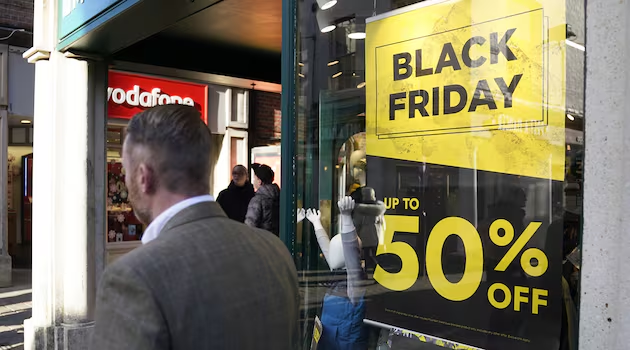
Criminals are “primed” to take advantage of the annual surge in online shopping this week. They will use contaminated links and fake sites to steal money from unsuspecting shoppers, according to the umbrella group representing the Irish banking sector.
The Black Friday and Cyber Monday sales window has already opened, with a huge number of retailers and service providers offering what they say are significant discounts.
However, the sales activity is set to ramp up as the week progresses, placing more unsuspecting consumers at risk.
The scale of shopping set to happen was revealed by AIB last week, with last year’s sales period setting a new record as AIB customers conducted just over one million transactions and spent €120 million online in a single day.
The busiest hour was from 10 to 11am, when 68,000 transactions were made, or 19 every second.
The frenzy is set to be replicated this year ad while there will be bargains, the Banking and Payments Federation of Ireland (BPFI) has warned shoppers to be on their guard.
“During this peak online shopping period, there is an increased risk to shoppers, with fraudsters primed to take advantage of Black Friday, Cyber Monday and the Christmas rush,” its head of financial crime, Niamh Davenport, said.
She warned that scammers will use contaminated links hidden within emails, social media and online adverts “which lead unsuspecting shoppers to counterfeit websites”.
The bogus sites can impersonate well-known stores or brands, offering discounted deals to entice people, but the deals subsequently turn out to be nonexistent. And those who are duped do not get what they paid for and risk having their bank or credit accounts compromised.
[ ‘Tis the season to be scammed: shoppers fall for rogue websitesOpens in new window ]
According to research from FraudSMART, the fraud awareness initiative from the BPFI, one in five regular online shoppers has lost money through online scams, with some losses running into hundreds of euros.
“Worryingly, our research also highlighted that one in five shoppers admit to not taking basic security precautions when shopping online,” Ms Davenport said.
Among the precautions people should take is checking secure web addresses that begin with https rather than simply http. Shoppers should also keep an eye out for a padlock image in the web address.
Ms Davenport also reminded people to avoid using public wifi for payments and be careful when clicking on links embedded in social media posts or pop-up adverts.
She noted that as many as 50 per cent of online shoppers admit to clicking on links from social media or pop-up adverts instead of independently visiting and checking the website of the company.
“We are calling on people to be extra vigilant as the Christmas shopping season ramps up, especially with Black Friday deals flooding inboxes and social media feeds,” she said.
In order to help consumers spot potential scams, the BPFI last year launched the Scamchecker.ie tool, which offers shoppers a free and simple way to check the legitimacy of websites and links before they make a purchase.
By cross-referencing the link with a real-time database of known scam sites and malware hosts, Scamchecker.ie helps shoppers make an informed decision, used alongside other precautions, before buying online.
[ 100 Irish websites for all your Christmas presents: Shopping guide for the festive seasonOpens in new window ]
“These scams can be very deceptive and difficult to spot. That’s why we are calling on consumers to pause for thought before parting with their money or information online and familiarise themselves with a few simple protective steps,” said Ms Davenport.
She stressed that people should not be afraid to ask for help if something does go wrong. “If you think you have fallen victim to an online shopping scam, contact your bank immediately using the number on the back of your debit or credit card and report the incident to the Gardaí.”





